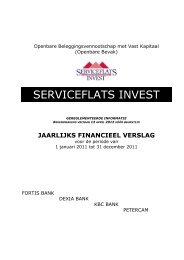A N N U A L R E P O R T A N D A C C O U N T S - CMVM
A N N U A L R E P O R T A N D A C C O U N T S - CMVM
A N N U A L R E P O R T A N D A C C O U N T S - CMVM
You also want an ePaper? Increase the reach of your titles
YUMPU automatically turns print PDFs into web optimized ePapers that Google loves.
Management Report of the Board of Directors - Financial Year 2008<br />
display their respective business development, of the<br />
performance and position of each of these entities,<br />
containing a description of the main risks and uncertainties<br />
they face.<br />
II. ECONOMIC BACKGROUND<br />
In order to provide a better understanding of the information<br />
supplied, a brief description of the overall economic and<br />
financial background against which the Group carried out its<br />
activities will be provided, mentioning some of the constraints<br />
experienced by the different markets, obviously highlighting<br />
the national situation.<br />
During 2008, there was stagnation in Portugal’s annual GDP<br />
growth, which had increase 1.9% in 2007. This negative trend<br />
reflects, above all, the dramatic drop in investments and<br />
exports over a period in which the full force of the economic<br />
crisis was felt, especially in the fourth quarter, where there<br />
was a -2.0% variation on the previous one. This is the worst<br />
result recorded in Portugal since 1984.<br />
This trend follows the one observed in the Euro Zone, in the<br />
USA and in Japan, with global trade shrinking at the quickest<br />
and most intensive pace since the Great Depression.<br />
In fact, in 2008, the financial markets experienced their<br />
worst crisis since the 30’s, triggered by US real estate<br />
market crash, thus called the “sub-prime crisis”, although<br />
the real causes were much more varied and deeper. This<br />
situation, in addition to the sharp increase in the trade<br />
balance deficit, the high oil prices and the severe crash of<br />
the global stock markets, had a significant impact on<br />
countless economic sectors and consequently, on the<br />
unemployment rates.<br />
In spite of this situation, in Portugal, according to the INE<br />
(National Institute of Statistics), the average unemployment<br />
rate in 2008 settled at 7.6%, 0.4 percentage points less<br />
than that recorded 2007 and below the rate forecasted by<br />
the Government, which estimated an average value of<br />
7.7%. From this value, 47.8% correspond to long-term<br />
unemployment, the lowest percentage in the last four<br />
years.<br />
However, the increase in unemployment has had a very<br />
negative social impact worldwide. After four consecutive<br />
years of decreasing rates, in 2008 there was a reversal of<br />
this trend, with a total of 190 million unemployed worldwide<br />
at the end of that year. According to studies by ILO<br />
(International Labour Organisation), in 2009 there could be<br />
more than 40 million newly unemployed, thus increasing the<br />
global rate to 7.1%, equivalent to 230 million workers. In<br />
parallel, according to World Bank data, the number of people<br />
living below the poverty line (USD 1.25 per day) may<br />
increase substantially, eliminating all the progresses<br />
achieved since 1997.<br />
In response to the crisis, governments and central banks<br />
have attempted to coordinate efforts, implementing<br />
countless economic stimulation packages and emergency<br />
interventions, reducing interest rates and injecting short-term<br />
liquidity. However, these measures, especially aimed at<br />
preserving the financial system and preventing the<br />
bankruptcy of large-scale companies, as well as ensuring the<br />
maintenance of jobs and supporting investments in<br />
infrastructures, shall take time to produce visible effects in the<br />
current economic situation.<br />
Considering the unforeseen dimensions of the crisis and,<br />
also, that the fiscal and monetary policies of the world’s main<br />
economies may only achieve results in the medium term,<br />
there is real concern that the consumption standards will take<br />
time to return to previous levels, already quite precarious in<br />
underdeveloped or developing countries.<br />
There is consensus among analysts and observers that, in<br />
2009, the crisis will worsen before it starts to recover.<br />
However, there are a few positive aspects, such as the fact<br />
that stock markets are already negotiating with less<br />
volatility and that there is already a reduction in the final<br />
price of fuel to the consumer, as a result of the abrupt drop<br />
in oil prices. The decrease in the Euribor rate also had a<br />
positive impact on the reduction of banks’ housing loan<br />
15

















